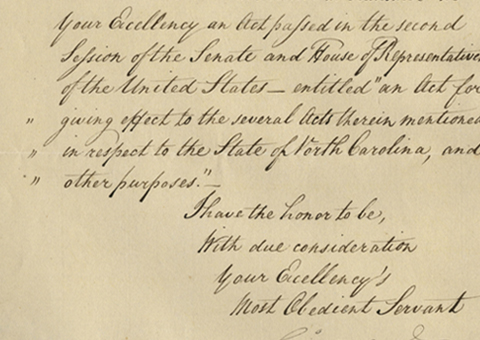The Conclusion of Charles Sumner’s Famous Speech to the Senate in Favor of the Civil Rights Bill of 1866, the First Ever Enacted


It gave former slaves and other Black people citizenship and equal rights under the laws
“And may declaring my belief in liberty & equality as the God-given birthright of all men, let me say…that if this be an error, it is an error which I love; if this be a fault, it is a fault which I shall be slow to renounce…”
Charles Sumner was Senator from...
“And may declaring my belief in liberty & equality as the God-given birthright of all men, let me say…that if this be an error, it is an error which I love; if this be a fault, it is a fault which I shall be slow to renounce…”
Charles Sumner was Senator from Massachusetts and one of the foremost abolitionists in the Antebellum period. After addressing the Senate in a speech entitled the “Crime against Kansas” on May 20, 1856, in which he called slavery a harlot and slaveholders depraved criminals, he was savagely beaten in his seat by Congressman Preston Brooks of South Carolina. Though the wounds healed, his brain sustained more damage than was initially thought, and it was another three years before he was able to resume his duties in the Senate. He became a martyr in the north and Brooks a hero in the south, and sectional tensions increased as a result. Sumner remained in the Senate until his death in 1874, though he was often forced to curtail his activities because of the lingering effects of his beating.
The Civil Rights Act of 1866, enacted April 9, 1866, was the first U.S. federal law to define citizenship and affirm that all citizens are equally protected by the law. It was mainly intended, in the wake of the Ciivil War, to protect the civil rights of persons of African descent born in or brought to the United States. Sumner spoke in favor of the bill, and that speech was printed in “Charles Sumner, The Complete Works”, published in 1874.
These are the concluding lines from that speech, which Sumner here quotes.
Autograph quotation signed, Boston, September 20, 1866. “And may declaring my belief in liberty & equality as the God-given birthright of all men, let me say, in the same spirit, that if this be an error, it is an error which I love; if this be a fault, it is a fault which I shall be slow to renounce; if this an illusion, it is an illusion which I pray may wrap the world in its angelic forms.”

Frame, Display, Preserve
Each frame is custom constructed, using only proper museum archival materials. This includes:The finest frames, tailored to match the document you have chosen. These can period style, antiqued, gilded, wood, etc. Fabric mats, including silk and satin, as well as museum mat board with hand painted bevels. Attachment of the document to the matting to ensure its protection. This "hinging" is done according to archival standards. Protective "glass," or Tru Vue Optium Acrylic glazing, which is shatter resistant, 99% UV protective, and anti-reflective. You benefit from our decades of experience in designing and creating beautiful, compelling, and protective framed historical documents.
Learn more about our Framing Services










































































































